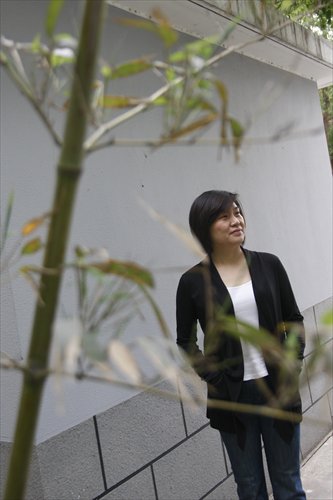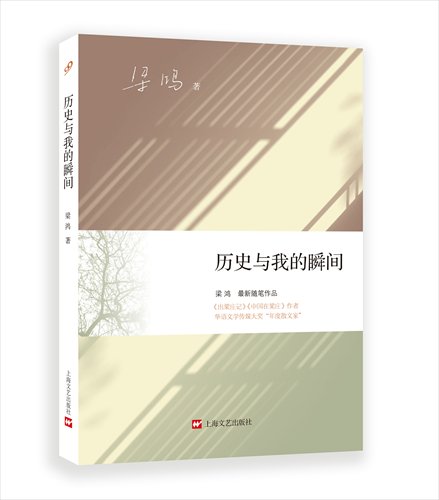A heavy heart still beats
One writer’s struggle with helping China’s rural areas

Liang Hong

The cover for History and My Moments Photos: Courtesy of Liang Hong
Seven years have passed since writer Liang Hong decided to go back to Liangzhuang, her hometown village in Henan Province, to carry out a field study. The two books, China in Liangzhuang (2010) and Going Out of Liangzhuang (2013), that grew from her observations during this time have put Liang into the spotlight innumerous times as well as winning her several awards. The two books, landmark works for recording the plight of rural villagers and migrant workers, also made her an name practically synonymous with the study of rural China and migrant workers in cities.
But looking back, while she is proud that she had sufficient courage and persistence to have done so, Liang expressed some regret about her passive observations of the condition of rural villages and the people living there. "Real life shows its villainous and complicated side right in front of you. You engage in observation and trying to understand its finest structure from the inside, after which you illustrate it for others. Then, you exit safe and sound, and do nothing about it at all," Liang wrote in her recently published new book History and My Moments.
"What is really cruel is that you see it, face it, write about it and have a heavy heart for a few days - then you just walk away," Liang told the Global Times.
Observer's guilt
A collection of Liang's latest essays, History and My Moments continues her philosophically profound line of thinking that appeared in China in Liangzhuang and Going Out of Liangzhuang.
From regional snacks and specialties to traditional customs for the Lunar New Year, Liang starts the book by describing her hometown in detail in a seemingly much more relaxing tone, though not without showing the helplessness of people she met: lonely elderly, children being raised by their grandparents as parents work in far off cities and so on.
While her previous two non-fiction works tried to stay neutral and objective when depicting people's stories and seldom explicitly revealed her personal feelings, the articles collected in her new book allow Liang to share with readers her feelings in a more direct and clear manner.
"Villagers are migrating in large numbers. They want to seek a 'land flowing with milk and honey' even if they might die half way there, a bit like what is described in Exodus," Liang wrote in Going Out of Liangzhuang.
"But they fail to find 'milk and honey.' Rather, they struggle and drift on the margins and shadows of the land, being discriminated against, forgotten and dispersed and stuck in a dilemma… They are abandoned."
A writer who saw this misery first hand, Liang has long suffered from feelings of guilt and helplessness that she has been unable to do anything except write about these issues.
"I comfort myself by thinking that I did enough as a writer by representing this complicated side of life as accurately as possible and that actually resolving this problem is a more complex subject," Liang said. "But the problems today's rural areas face still make those who write about them feel helpless."
The wave of history
Liang also reflects on the relationship between history and herself as an individual by reflecting on several of important moments in her life in an article titled "History and Several of My Moments."
Through her father's struggle with the then Party Secretary of the village towards the end of Cultural Revolution (1966-77), villagers' love for Hong Kong TV series in the 1980s and the clash between commercialism and traditional villages after the nation's reform and opening-up, Liang manages to build a relationship between ordinary people like herself and big events in history. But she immediately also depicts how powerless ordinary people can become amongst a wave of historical change.
"For a Chinese, sorrows and joys are never a natural part of life, but rather are forced changes due to changes in politics or systems," she wrote in the article.
In the article, Liang goes on to touch on today's social reality as a result of rapid changes, particularly the fate of villages such as Liangzhuang.
"That type of life and tradition fade quickly like the tide… Its speed and the wounds left behind are appalling… From Liangzhuang's fate, I can see that we still have a long way to travel along the path of 'modernization' and, if we do not deal with the relationship between 'villages,' 'cities' and 'modernization' right now, Liangzhuang and countless other Liangzhuangs will continue to drift without an anchor."
As China's rapid urbanization makes the downfall of its rural areas seem inevitable, many people have started to pay more attention to the fate of rural villages. "This shows there is a crisis and people are generally anxious about this issue," Liang said, going on to explain that she is worried that rural issues may just become some emotional fad that never gets treated seriously in the long run.
Sociology VS literature
Liang's observations and use of language in her two non-fiction books about Liangzhuang have proven so valuable as sociological studies that many sociologists recommend them as must-read books for sociology students. However, this praise also sometimes makes people overlook her identity as a writer and literary scholar.
A university professor specializing in Chinese literature, Liang has dedicated herself to the study of literature since college, writing many important academic papers in addition to her books about Liangzhuang.
"I'm a pure literature woman. I've had a great passion for literature since childhood and chose Chinese as my major without any hesitation," Liang laughed.
"Literature and sociology are closely related. Both are about people's life experiences. It would be marvelous if we could integrate them seamlessly together," Liang said. "This is my goal."
Liang revealed to the Global Times that in August or September she plans to publish a collection of short stories - currently being serialized in Shanghai Literature magazine - in a book titled Wuzhen under A Cloud as a way of reiterating her identity as a fiction writer.
According to Liang, the collection will focus on the stories of ordinary people living in a small town in an attempt to demonstrate the complicated spiritual side of these people.
"It will only occasionally touch upon social realities and instead concentrate on depicting human nature," Liang said.
"Including a doctor, a shopkeeper and even a homeless person, it will be an interesting read."